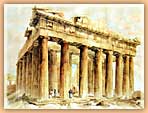 |

The Greek Revolution was assisted from the very beginning by a
vibrant wave of support from the most important European cities. Philhellenism, as such support was called, contributed considerably to the Greek cause. First of all, philhellenes
contributed financial aid, provisions and volunteers. Furthermore, they applied pressure on European governments to adopt a more favourable attitude towards the Greek revolutionaries. Despite the occasional trough in support, the philhellenic movement attracted the interest of some of the most significant personalities of that period. Intellectuals, scholars, persons of the arts and letters worked voluntarily towards Greek Independence.
Moreover, a great number of volunteers joined the rebellious regions in their fight for the
creation of an independent Greek state. Among them were notable military officers from the time of the Napoleonic wars, students, persecuted revolutionaries
as well as adventurers and opportunists for which the Revolution appeared as an adventure and, indeed, a profitable one.
Regardless of the many motives, the different customs and the incompatible expectations of the philhellenes, they all helped in keeping the concern of the European public opinion for the Greek Revolution alive, particularly in the important urban centres of Europe.
The diffusion of awareness and appreciation of the civilization of ancient Greece that swept through Europe in the late 18th and beginning of the 19th centuries was one of the two main reasons for the development of philhellenism. The idea of the creation of a Greek state on the territories
on which Greek Antiquity had thrived struck Europeans as fascinating, especially the educated and prosperous bourgeois classes.
The restoration of the old regimes, the pressure and persecution that the
liberal, radical and revolutionary movements and persons experienced
after 1815 did not allow free expression and even less the promotion of political and social claims of the French Revolution.
Furthermore, the revolutionary movements were repressed one after the other. Under these conditions, the Greek uprising constituted a source of inspiration and expectation which, although they were bound to be belied, were capable of activating many people for its successful end.
|
 |